

On Stage - Head Table - The Membership - Blacklist - Visitors
|
Here you'll find a gathering place for associates "Skirts" "A Good Man Is Hard To Find"
Charles Baggs ("Doc")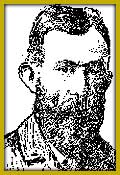
GOLD CLUB Called by some "King of the Con Men," Charles Baggs is credited with inventing the fake gold brick swindle, and refining the monte store techniques created by his friend Ben Marks, which later evolved into the big store practiced with such efficiency by Lou Blonger's organization. Baggs is said to have been a Blonger associate, as well as part of Soapy Smith's operation in Denver. More about Doc BaggsMayor Dewey C. Bailey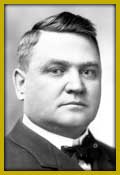
PLATINUM CLUB Bailey is a familiar name, serving as he does as Denver's mayor at the end of Lou's career. It's reasonable to assume Lou's infamous "private line to the mayor" rang in Bailey's office. Van Cise only referred to him as "the Mayor" in Fighting the Underworld. When it was said that Lou could set a man free with a phone call, Bailey was at the other end of the line. More about Mayor BaileyRichard Ballinger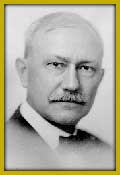
GOLD CLUB In 1909, Richard Ballinger found himself accused of influence-peddling in a scandal well-known as the "Ballinger-Pinchot Controversy," involving a promising Alaskan coal field. Standard Oil wanted the field, but wasn't allowed by law to claim it, thanks in part to the conservationist policies of Theodore Roosevelt. Instead, numerous Seattle businessmen, including Simon Blonger, had claimed the land in small parcels, intending to sell out to Standard as a group. More about Richard BallingerJohnny Behan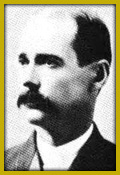
GOLD CLUB Known, of course, as the Cochise County sheriff whose posse never managed to cross paths with Wyatt Earp's during Wyatt's infamous Vendetta ride. As it turns out, in 1883 he also bought a racehorse from Sam Blonger, in Tuscon, Arizona. The price was $300, and the nag went by the curious name of Brown Dick. E. M. BernardPLATINUM CLUB In 1882, Bernard was a reporter for the Albuquerque Evening Review, until he was fired, at which time he took a job with the Morning Journal. A stalwart supporter of Sam Blonger, he was even accused of having penned Sam's published response to charges of non-performance of duty. His old employer later had this to say of Mr. Bernard: "It may be interesting for some to know that Mr. Blonger's dislike of this paper dates from the discharge of a reporter who was formerly weak enough and fond enough of liquid and nicotan [sic] stimulants to espouse the cause of the officer whenever a dark-looking case came before the public, and the fact is probably of the same degree of interest that this reporter is now employed at the Journal. THE REVIEW is published as a newspaper, and any of its reporters who suppress the news will be promptly scut over to the Journal office with a letter of recommendation." And this, of the Journal after they hired Bernard: When Deputy Sheriff Blonger takes snuff now, the Journal sneezes. This, for a paper which a month ago had an opinion on the Chinese question, is something of a fall. More about BernardCole Braddock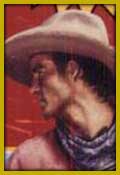
BOLONIUM CLUB Matt Braun's western detective sometimes sought the assistance of Denver kingpin "Lou Blomger." Whores and crooked gambling dens, even bunco games, were condoned by Blomger. Still, he drew the line at spilling citizens' blood or forcibly separating them from their wallets. He declared that any man who stepped over that line would be judged an outlaw even among his own kind. With his rise to power, peace had settled over Denver. The public viewed the Tenderloin as a tawdry playground, and the rackets operated with blissful tranquility. Gunslingers, highwaymen, and thieves were welcome for as long as they had cared to sample the delights of Denver's heady atmosphere. But only if they minded their manners and weren't tempted to molest the local residents. Otherwise they were found floating facedown in Cherry Creek. Con Caddigan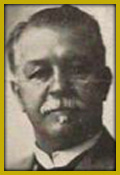
PLATINUM CLUB Caddigan was a gold brick artist, gambler, showman and swindler who seems to have followed the same star as the Blongers for at least a few years. We can track him to Deadwood in '76, along with Billy Nuttall of the notorious No. 10 Saloon, Bill Hickok, and perhaps even Joe Blonger, then Leadville in 1879, where Nuttall was doing business, and Sam and Lou as well, then Denver in the early Eighties, and finally Albuquerque in 1882. In December, shortly before the Blongers moved on from Albuquerque, Caddigan was busted — but later acquitted for lack of evidence — for using his position as constable to assist Nuttall and a few others when they swindled a guy out of his last few dollars with the top and bottom scam. He was at one time Town Marshal of Albuquerque, but departed hot-foot from the city in 1883 with an alert vigilance committee close behind, punctuating their warnings never to return with arguments more emphatic than words. More about Con CaddiganEd Chase ("Big Ed")PLATINUM CLUB Ed Chase was a Denver pioneer and to this day a favorite son, a veteran gambler and showman. Lou's obituary tells us Chase had a gambling house above the Blongers' first Denver saloon on Larimer. Chase and his partner Edwin Gaylord became well-known for their theaters, gambling parlors and saloons, notably The Palace, in Denver and Cheyenne, and as such had their hand in the bunko game as well, before the Blongers solidified their control over this particular activity. Both headed Denver's policy shop association while Lou reportedly had numerous Denver shops of this variety. In 1895, a rift opened between the Chase-Gaylord and Blonger gangs when a group of Big Ed's men took the fall for a swindle apparently perpetrated by the Blonger men. Chase complained the Blonger boys were in fact responsible for the crime, and had them arrested. The DA, perhaps at Chases's request, enticed Soapy's Smith's brother Bascomb — in the county jail for beating a Denver bartender — to testify against Sam in the case, in exchange for his freedom and a job as a cop. To no avail. Sam was acquitted, and Bascomb remained behind bars, accusing the DA of breach of promise. Chase is remembered for his method of keeping the peace in his joints — keeping an eye on the proceedings with a shotgun in his lap. Deputy Tom Clarke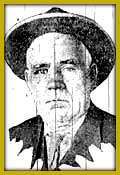
PLATINUM CLUB - PROVISIONAL Called Hal Crane in Van Cise's book, the good deputy sheriff — an extortionist by trade — was just the kind of cop Van Cise feared would blow his investigation. Clarke ran the county court with a high hand, and controlled prostitution in Denver's black neighborhoods. Old friends with the mayor since their days as U.S. Marshals, Clarke was said to have been able to influence the police department — on Lou's behalf — through the mayor's office. Unfortunately for Lou, Van Cise relied on the Colorado state rangers and private citizens to make the arrests. More about Tom ClarkeSamuel Clemens ("Mark Twain")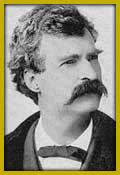
SILVER CLUB Clemens began his writing career as a reporter for Virginia City's Territorial Enterprise in 1862. Virginia City is situated midway between Sacramento and Austin, and Sam was said to have been a teamster hauling freight between those two cities, probably around 1862 or 1863, during Austin's initial boom. Clemens reportedly first used the pseudonym Mark Twain in 1863. If his obits are correct on this point, Sam undoubtedly would have spent time in Virginia City's saloons. Clemens lived there until 1864, leaving town in a rush after challenging James Laird to a duel. The connection's pretty iffy, sure, but who wouldn't want to party with the Twainster? William F. Cody ("Buffalo Bill")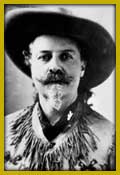
GOLD CLUB The Armstrong and Swinbank accounts say Sam and Joe both scouted with Buffalo Bill, but the claims remain unproven, and perhaps a little hard to swallow. Worthy of inclusion in an obituary, I would think. Even so, they were likely both scouts to some degree (under circumstances difficult to research), and it is plausible, even likely, that Sam and Lou were acquainted with Cody as fellow gamblers, showmen and socialites, particularly in the Leadville area around 1879, and later in Denver from the 1890s till Cody's death in 1917. Could they have been unacquainted? More about Buffalo BillCrazy Horse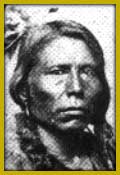
SILVER CLUB As a prospector in the Black Hills and beyond, Joe Blonger claimed to have been acquainted with Crazy Horse. As Mary Armstrong wrote: "Joe Belonger joined the gold-rush to the Black Hill in 1874, and became a personal friend of both Sitting Bull, the great Sioux wars chief, and Crazy Horse, the powerful Ogalalla chief who commanded thousands of Northern Cheyenne warriors." "Joe, being quiet, friendly and honest enjoyed the good will and friendship of every Indian he met from the Sioux and Cheyennes in the Dakotas all the way down to the Mexican Border. Although a real hero of our early-day West, professional historians never heard of him because he never swaggered around talking "about himself as many self-praising heroes do." "Easy going and fair dealing, Joe Belonger hadn't even one real enemy, red or white in all our great West. Only the other members of the Belonger family knew about his many brave acts of personal risk." We have no evidence to contradict the claim, and reason to believe he was in the area, prospecting. Beyond that, we may never know the truth, but let's be clear — we do believe Joe could tell a good story. General George Armstrong Custer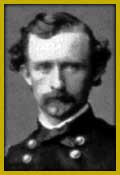
SILVER CLUB In the Armstrong account, Joe claims to have scouted for Custer — and to have been declined when he offered to assist at Little Big Horn. "Joe tried to enlist to go with General Custer into the battle that proved to be his last. If there had been enough horses and mules for all who wanted to go, Joe, with many other white men would have been killed along with Custer and his regular soldiers of the Seventh Cavalry." It is likely he was in the region prospecting, and that he would probably be well-suited to scout duty, as a healthy young prospector and veteran. But in the detailed studies of the event we have yet to find evidence indicating Joe was present. More about Col. CusterDetective Mike DelaneyPLATINUM CLUB Delaney was the Denver Police Chief of Detectives in 1901, when he arrested Lou for bilking a man named Ritter in a poker game. But on the stand he painted a rosy picture of humanitarian Lou, and the case was dismissed. It's hard to convince a jury you were cheated at poker. In 1904, he was Chief of Police when he busted two of his own men, with their girlfriends. The cops made bail, but Delaney refused to release the girls. One of the men went to Lou and asked him to get the girls out, so he called Delaney, who set them free. They later came to Lou to thank him, and Lou became smitten with 19-year-old Iola Readon — who would become Lou's mistress, his companion for many years, until Lou's arrest in 1922. Detective Leonard DeLue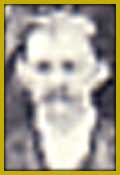
PLATINUM CLUB Referred to as Leon Dean by Philip Van Cise, DeLue was chief of county detectives during Lou's rise to power in the 1890s, and proprietor of his own private detective agency by the time of Van Cise's election in 1920. It's possible, even probable, that Sam and/or Lou worked with DeLue at some point, as peace officers or private dicks. Colonel Van Cise tells us he first met with Lou at DeLue's insistence, at a time when Lou had money and votes to influence the Colonel's election campaign for district attorney, but Van Cise would have none of it. This personal affront made Lou's arrest a priority for Van Cise upon his election. More about Detective DeLueCol. William Neil Dennison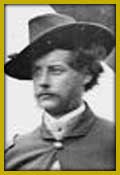
PLATINUM CLUB Dennison, son of a governor and a scoundrel to boot, was a District Attorney in Denver during the 1890s, and a partner in the Forest Queen until the day he died. More about Neil Dennison"Slats" DragoBOLONIUM CLUB Slats was bodyguard to "Lou Blomger" in the Matt Braun novel Shadow Killers. "Have a seat, Cole. You ought to drop around more often." "Well, you know how it is, Lou. No rest for the weary." Blomger chuckled. "I know the feeling all too well. What can I do for you?" "It's personal." "Pay no mind to Slats. He's deaf and dumb where my affairs are concerned." "No offense, but this time..." Braddock shrugged. Blomger regarded him thoughtfully. After a moment, he glanced across to Drago. "Wait outside, Slats. I'll call if I need you." Drago shot Braddock a dirty look. Then he opened the door and stepped into the hallway. When the latch clicked, Blomger slowly shook his head. "I think you hurt Slats's feelings. He considers himself a professional." Adolph Duff ("Kid Duff")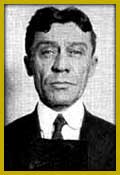
PLATINUM CLUB Starting out as a pickpocket, Adolph W. Duff worked with the Webb City gang, and the Mabray gang in Council Bluffs, Iowa. Many of the same con men worked both cities, and there were close ties between the organizations. Eventually Duff became a boss himself, fixing bunco arrests in Colorado Springs until threatened himself with real jail time. Moving on to Denver, he soon became Lou's manager, handling training and logistics for the various crews, and providing Lou with an added layer of deniability between himself and the gang's daily operations. Duff committed suicide after his release from prison. More about Kid DuffDetective Peter EalesPLATINUM CLUB In 1894, General Tarsney and his Colorado state militia were sent to protect striking mine workers in Cripple Creek from the county sheriff's department and their hired thugs from Denver. Soon after, Tarsney was tarred and feathered outside Colorado Springs. Peter Eales, a former marshal of Cripple Creek, was assigned by Chief of Police Armstrong of Denver to extract a confession from one of Tarsney's attackers, Joe Wilson. Wilson implicated the sheriff's department in El Paso County. As he continued his investigation, we are told that Lou accompanied Eales and his party of Denver city detectives to Colorado Springs. But what was Lou's role in the affair? Perhaps to ensure that the culprits were returned to a friendly environment in the courts of Denver. Eales was reprimanded by authorities in Cripple Creek for trying to take the accused out of the county under suspicious circumstances. Later, Eales absconded to Alaska with $6000 he had been sent to retrieve in an official capacity. More about Detective Peter EalesRoy Earle ("Mad Dog")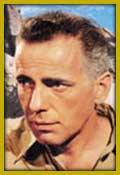
BOLONIUM CLUB Played by Humphrey Bogart in the movie, the protagonist of W.R. Burnett's High Sierra didn't know Lou directly, but was well aware of his reputation. Take my pal, Barmy. He was the smartest there was. Used to be rolling in dough. But he got old and they caught up with him. Like we all get caught up with some day. He worked with Blonger, the Big Guy, in the old days, and he used to make sometimes as high as two hundred G's a winter in Florida. In the summer he worked Denver, where the fix was perfect. For contributing a quote like that, Mad Dog gets himself a seat at the bar. Wyatt Earp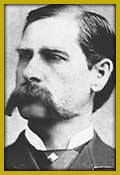
GOLD CLUB Where or when the Blonger Bros. met Wyatt Earp we don't know — as fellow Dodge City gamblers in the late Seventies, probably, in the town's prime — but it appears the Earp posse sought rest in Marshal Sam Blonger's New Albuquerque after the killing spree that followed the Tombstone gunfight. The idea might have been Wyatt's, or that of Holliday, who was a Blonger competitor in Leadville, as was Bat Masterson, or Jim Masterson, Charlie Ronan, or others. As lawmen in Tombstone, it's likely the Earps and Holliday were aware of Sam's position in Albuquerque. More about Wyatt EarpJohn Homer French ("Dapper Jackie")
PLATINUM CLUB Best remembered for his embroidered silk shorts, Jackie French was a favorite with the ladies; numerous female admirers attended the trial and sent him gifts. The very essence of the debonair smoothie, French worked for Lou's gang in the role of Bookmaker, representing the fictitious stock exchange or betting parlor. He also taught classes in the finer points of the big con. French was a personal favorite of Lou's, and was in attendance at Deputy Clarke's "drunken orgy" at the end of the trial. Joe Furey ("Big Joe")
PLATINUM CLUB Furey, a grifter of over thirty years, isn't as well-known as many of the other guests, but the name alone gets him in the door. A sometime partner of William Elmer "Christ Kid" Mead and his magic wallet, Joe became a major player in Denver prior to the Blonger Bros. ascendance, and later headed a crew under Lou's protection, working the tourist seasons from LA to Denver to Havana. He is most notable as the prime target of a two-year manhunt by Frank Norfleet, a retired Texas sheriff who was taken by Joe and his crew for a hefty $45,000. Norfleet made good on his vow to bring the whole bunch to justice. His persistence, Furey's arrest, and a star turn as a naive tourist ripe for the picking, were all instrumental in Van Cise's campaign to bring down Lou's organization. More about Joe FureyR. Gallagher ("Red")PLATINUM CLUB Gallagher, a Denver sport who accompanied Soapy Smith to Skagway in the 1890s, would later be the man to bail out Lou after his arrest in 1922. Drinks on the house — for life. Edwin GaylordPLATINUM CLUB Gaylord might be familiar to close readers of this site as the long-time partner, both in the gambling and bunco businesses, of Denver's gambling king, "Big Ed" Chase. Gaylord was a barkeep, then a cashier, then a proprietor of Chase's Palace Theatre. In 1889-1890, Gaylord was manager of the Colorado Policy Association, a position also notably held by Chase. Lou was said to have numerous such shops at the time. Chase and Gaylord were married to sisters, Frances Minerva Barbour and Adah S. "Addie" Barbour. Addie was an actress. The Chase-Gaylord gang is dead sore on the Blonger crowd, and the soreness is intensified now that they have been arrested for an offense from the proceeds of which they have made nothing. Gaylord later took a lease on the Blonger's Forest Queen mine, working it from 1915 until his death in 1923, as is evidenced by Lou's letters to partner O.W. Jackson and his widow. In fact, Gaylord was in charge when a wealthy new vein was discovered just two days after Lou's arrest. Buda Godman ("Helen Strong")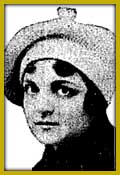
PLATINUM CLUB Watch out for this one, she'll steal ya blind. One of many intriguing figures in Fighting The Underworld was a con artist named Buda Godman, aka Helen Strong. A photo in the book depicts her outside a cabin, one foot up on the porch and her outstretched arm aiming a pistol. Paramour of the flamboyant Blonger bookmaker Jackie French, she also dabbled in blackmail, jury tampering, grand larceny, and the odd "badger game". You know the badger game: a pretty girl lures some well-heeled bigwig into a compromising position, an associate breaks in, takes some pictures, then they all sit down to haggle over the price. She'll fit right in. General Ulysses S. Grant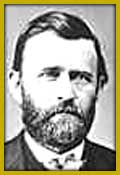
SILVER CLUB Family lore has it that General Grant was an aquaintance of father Simon Peter when Grant lived in Galena, just a few miles from the Belonger homestead in Shullsburg. At the time Grant worked in his father's store, and Simon Peter was a builder of rock walls — a surprisingly handy trade in the steep ravines of the Galena area. According to the Armstrong account: "Also, before the Civil War, in Galena, Illinois, Ulysses Simpson Grant, then engaged in farming, wood hauling and the leather business was heard to say that Mike Belonger was the best dance-fiddler on earth. H.B. Chamberlin, of Shullsburg, Wisconsin — an ex-soldier musician, heard Ulysses Grant say those words many times." In April of 1861, Grant presided over a meeting in Galena in response to Lincoln's call to muster troops. In May, Mike enlisted in the local regiment, the 3rd Wisconsin. Grant was by then in Springfield, seeking a meaningful post in which to serve. Should President Grant show up, ONLY THE GOOD HOOCH! William Butler Hickok ("Wild Bill")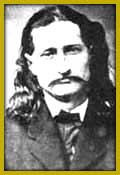
SILVER CLUB Joe Blonger claimed to have been the gunfighter's poker buddy in Deadwood, and according to the Swinbank account: "...he was standing right beside Wild Bill Hickok in Deadwood, South Dakota, when Jack McCall shot and killed Wild Bill. Uncle Joe felt the wind of the bullet." Joe's claims are unsupported, though it is perfectly reasonable to believe he was in the Black Hills at the time. Last seen in Salt Lake City in 1873, the young prospector was a prime candidate for the first wave of goldseekers to descend on the Hills, which was his claim. There he is said to have scouted for Custer, and become fast friends with the Souix and Cheyenne. As prominent gamblers in the Seventies, Sam and Lou may have made Bill's acquaintance. The corner seat table 12 is RESERVED FOR WILD BILL. More about Wild BillJohn Henry Holliday ("Doc")
GOLD CLUB On the run with Wyatt Earp, gambler Holliday probably socialized with the Blongers while they were laying low in Albuquerque; then again, it's just as likely they had met previously. The Blongers and fellow Knight of the Green Cloth Holliday were often reported in the same locale, from Dodge City to Leadville to Denver. More about Holliday and EarpAbraham Lincoln
SILVER CLUB The son of Blonger Sister Mary Swinbank, Gene Swinbank was said to have stated that the father of the Blonger Bros., a Frenchman named Simon Peter Belonger, was friends with both Ulysses S. Grant and Abe Lincoln while living in Shullsburg, Wisconsin. Grant is actually not hard to believe. He was working in Galena for a while just before the war, and Simon Peter is said to have had work there. Lincoln's a bit of a stretch, though. The one chance Belonger might have had to meet Lincoln — restricting our timeline to the Galena area — would have been a speech Lincoln gave there in 1856, addressing the slavery issue. Maybe he shook Lincoln's hand. William LivingstonPLATINUM CLUB As boys, Bill Livingston and Lou Blonger served together in the Civil War, and Bill visited Lou as he convalesced after injuring his leg in Tennessee. Lou and brother Sam eventually joined Bill at his family home in Mt. Carroll, Illinois, where Sam married Bill's sister Ella in 1866. Then the Livingston family, with Sam and Lou, moved to Red Oak, Iowa, then on to Salt Lake City, and a long trail of saloons and other businesses, and surely prospecting as well. Sam would divorce Ella in 1889, but the Blongers and Livingstons had a kinship that apparently lasted for decades. Mayor Wolfe Londoner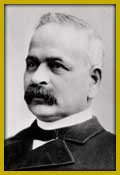
PLATINUM CLUB With the help of Soapy Smith, Bat Masterson, Lou, Sam and others like Sam Emerich, wealthy grocer Wolfe Londoner was elected mayor of Denver in 1889 by seventy-seven votes. In 1891, evidence of voter fraud forced his resignation. More about Wolfe LondonerJohn C. MabrayPLATINUM CLUB AKA: Maybray Mabray was the leader of the so-called "Millionaire's Club" of Council Bluffs, Iowa, specializing in fake sporting events — wrestling matches, boxing, foot races and horse races, with "branch offices" in Denver and numerous other cities. Lou's right hand man, Kid Duff, was said to have worked with the Mabray gang. Master con man and elder statesman Ben Marks was the gang's fixer. In 1910, the gang went down hard. Van Cise claimed evidence had been found in that investigation implicating Lou, saying he only escaped indictment — and publicity — with the help of an old friend, a U.S. District Attorney. We are told that the DA's law partner, accompanied by a U.S. Marshal, effectively shielded Lou through their presence in the courtroom. More about John MabrayBenjamin Marks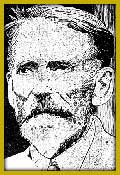
PLATINUM CLUB Marks, fixer for John Mabray's gang in Council Bluffs, is credited with developing the monte store concept, wherein shoppers in search of bargains are baited into playing three-card monte. The idea was later redefined by Doc Baggs as the big store, an undertaking favored by Lou's gang in Denver, and quite a profitable one at that. There were close ties between Mabray's operation and Lou's; many of the con men involved worked in both towns, at times. According to Van Cise, Lou was directly implicated in Mabray's Council Bluff operation when it went down in 1910. Marks is also remembered for the house he owned (and which we are told still stands) outside of Council Bluffs. Also used as a casino and brothel — his wife was a madam — the house straddled the county line, so patrons could avoid arrest by the authorities of one county simply by moving to the other end of the room. Bat Masterson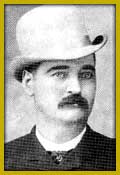
PLATINUM CLUB The quintessential sporting man and hired gun, Masterson and the Blonger Bros. are said to have been friends since the glory days of Dodge City in the late Seventies. He was a known confederate of the Blongers in Denver, where he operated a saloon for many years, and where they all took a very personal interest in local politics, particularly as it regarded the free trade in vice. More about Bat MastersonJ.W. McCulloughPLATINUM CLUB Bottler of Kentucky's famous Green River Whiskey, McCullough was for many years a partner in the Forest Queen mine. Legend has it Lou sold McCullough half his interest in the mine for 20 cases of Green River, said to be worth $200,000. For many years Green River claimed in its advertising to be "The Whiskey Without a Headache." What's more, it "Blots Out All Your Troubles." Lou later told his patrons the stuff better be good, he paid enough for it. William T. McReightPLATINUM CLUB McReight, who is said to have once played ball for the St. Louis Browns, formed Albuquerque's first professional baseball team in 1880, also named the Browns — McReight already had the jersey. The Browns played a game against local amateurs at Albuquerque's July Fourth celebration in 1882, and one might expect that Lou was in the crowd. When not playing baseball, McReight was a press operator for the Albuquerque Morning Journal, which was unerringly supportive of Sam and accused of being his organ. He later became involved in the local fire and police departments. McReight may well have been a Blonger associate. More about Bill McReightElmer Mead ("The Christ Kid")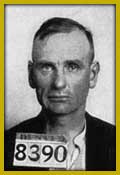
PLATINUM CLUB William Elmer Mead was best known for the development of the magic wallet, wherein the contents of a found wallet innocently suggest the financial prowess of the owner. When the owner returned, the enduring impression of the wallet's contents helped allay any skepticism regarding the sure thing subsequently proposed by the wallet's owner. This concept had innumerable applications in cons of all kinds, from the pigeon drop to the big store cons. Preferring normally to change partners often, the Christ Kid — so-called for his seemingly pious nature, the legacy of his strict religious upbringing — Mead was caught in Van Cise's web when the Blonger gang went down. Cornelio Murphy ("Murphy")PLATINUM CLUB Through much of Sam's short tenure as marshal of New Albuquerque, he was assisted by an able deputy named Cornelio Murphy. "A party of roughs rose up on their muscle at the dance hall last night and started up a general row. Marshal Blonger and his assistant, Murphy, entered into the fight and after a short battle placed the men under control and placed them safely in the jail in old town. There were four of them and they were pretty hard citizens. They will receive a trial in Sullivan's court to-day." Murphy was one of those remaining on the police force after Sam's departure. More about MurphyTony Neis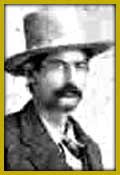
PLATINUM CLUB Tony Neis was part of the guard detail, along with the ill-fated Bob Olinger, that brought Billy the Kid to trial in La Mesilla. In 1882 he was a deputy U.S. Marshal in New Mexico, and that year opened an Albuquerque branch of the Rocky Mountain Detective Association. Sam and Lou Blonger were both said to have joined Neis at the Association, for a time. At one point, Lou accompanied Neis out of town, apparently on a manhunt. "Toney Neis and Lou Blonger went down the road last night." Late in 1882, Sam ran for constable against Con Caddigan and Tony Neis, and Caddigan won. More about Tony NeisBill NuttallPLATINUM CLUB Billy is remembered today as proprietor of Deadwood's No. 10 Saloon, where Hickok met his end in 1876. Did Joe Blonger know him at the time? He claimed to have been in the place with Wild Bill the night he died. Billy leased the Bella Union Theatre in Deadwood for a while, and in 1879 resurrected the theatre in Leadville, when Con Caddigan, Lou and Sam were also in town. Caddigan and his gang, including Billy Nuttall, worked cons in Deadwood, Leadville, Denver, then Albuquerque. In December of 1882, after Sam's firing, Nuttall was arrested for scamming a man out of his last few dollars. Constable Con Caddigan was implicated as well, but released. Did Nuttall or Caddigan ever work with the Blongers, or under their wing while Sam was marshal? More about Billy NuttallGovernor Miguel Otero, Jr.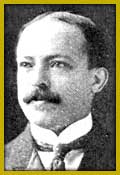
GOLD CLUB As a young man, Miguel Otero was sent by his father, a successful New Mexico businessman, to see to the needs and comfort of Wyatt Earp and his posse while they laid low in Albuquerque after their Vendetta ride. The younger Otero would go on to become governor of New Mexico, then later in life he would author a three-volume memoir. In 2001, a copy of the first volume was bought at a flea market. Within the pages was a carbon copy of a personal letter, undated, from Otero to a friend. It says, in part: "Some days later Earp and Holliday had a falling out at Fat Charlie's one night. They were eating when Holliday said something about Earp being a Jew boy. Something like Wyatt are you becoming a damn Jew boy? Earp became angry and left. Charlie said that Holliday knew that he had said it wrong, he never saw them together again. Jaffa told me later that Earp's woman was a Jewess. Earp did mu-[illegible] when entering his house." "Wells Fargo arranged safety in Colorado and the road gave them passage to Trinidad. I remember that Blonger and Armijo kept watch over the boys. I was able later, when governor, to reward Armijo for that favor to my father. That is all I know about the Earps." Earpologists are interested in the letter because of the first paragraph. This may explain the schism that appeared between Earp and Holliday at the time, a matter of some debate over the years. It is, of course, the second paragraph that interests us. More about Miguel Otero, Jr.Forbes Parkhill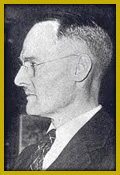
PLATINUM CLUB Parkhill isn't here for the booze or women, he's following a hot lead. Well, maybe just one. Drink As a reporter for the Denver Post, Parkhill scooped the story of the Blonger gang's arrest. The night before the raid he received an anonymous tip, did some snooping around the city building the next morning, and finally found his way to the Universalist Church — where the detainees were being held to keep the Denver police out of he loop — before the arrests were complete. He was allowed inside on condition he remain incommunicado until they had pinched as many of the gang as circumstances would allow. Parkhill managed to sneak a call, but Van Cise pressured the Post into holding back his big scoop, a move that bothered the newsman for many years. Parkhill went on to write numerous books about the Wild West, including, appropriately, Wildest of the West. More about Forbes ParkhillWilliam Pinkerton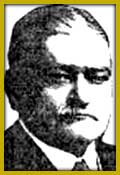
PLATINUM CLUB Pinkerton, head of the country's most famous detective agency, was reputed to be Lou's dear old friend from his Chicago days in the 1860s, or perhaps a little later in Dodge City. They were said to have met yearly in Hot Springs to reminisce about the old days and keep each other current on both the doings of the law, and of the underworld. It's worth mentioning, as well, that Sam and Lou were both members of the Rocky Mountain Detective Association at one time, and seem to have engaged in criminal investigation on numerous occasions, in various capacities, perhaps as late as the 1890s. More about William PinkertonCharles RonanPLATINUM CLUB Though Sam's tenure in Albuquerque was apparently unmarred by murder, there was a shooting the December before. A drunken miner named Eagan on a train, eager to shoot somebody, got off at the Albuquerque station, and promptly picked sporting man Charlie Ronan as his target. Three shots later, Ronan, unscathed, fired back with a shot through Eagan's heart. Ronan was acquitted by Judge Sullivan. "He then said, 'you don't want to say anything more on this platform or I'll give it to you,' and then after a moment he continued, 'I'll give it to you any way,' and suiting his action to the word he drew his revolver and fired. I jumped aside and pulled my pistol, and when he fired again I fired. He fell just as he fired the third shot. I never saw the man before and I don't think he ever saw me." Ronan was already a veteran of the Battle of The Plaza, when he allegedly assisted Bat Masterson in a noted 1881 Dodge City street fight, a skirmish that lead to Ronan, Bat, his brother Jim and Tom O'Brien being told to get out of Dodge — and not to come back. Charlie went on to become one of Sam's posse, noted as present at the Shootout on Railroad Av. and Griffin's Run. More about Charlie RonanSitting Bull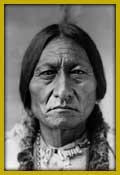
SILVER CLUB As a prospector in the Black Hills and beyond, Joe Blonger claimed to have been acquainted with Sitting Bull, as well as Crazy Horse. Again, as Mary Armstrong wrote: "Joe Belonger joined the gold-rush to the Black Hill in 1874, and became a personal friend of both Sitting Bull, the great Sioux wars chief, and Crazy Horse, the powerful Ogalalla chief who commanded thousands of Northern Cheyenne warriors." "Joe, being quiet, friendly and honest enjoyed the good will and friendship of every Indian he met from the Sioux and Cheyennes in the Dakotas all the way down to the Mexican Border. Although a real hero of our early-day West, professional historians never heard of him because he never swaggered around talking "about himself as many self-praising heroes do." "Easy going and fair dealing, Joe Belonger hadn't even one real enemy, red or white in all our great West. Only the other members of the Belonger family knew about his many brave acts of personal risk." We have no evidence to contradict the claim, and reason to believe he was in the area, prospecting. Beyond that, we may never know the truth, but let's be clear — we do believe Joe could tell a good story. Jefferson Randolph Smith ("Soapy")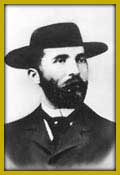
PLATINUM CLUB Archetype of the master con man, Soapy will forever be associated with the soap con, wherein onlookers were persuaded to buy bars of soap in hopes of receiving the bar wrapped in hidden ten or twenty dollar bills. Of course, none of the bars contained money. But Smith was no mere grifter, not by a long shot. A man of commanding presence, hot-tempered and prone to display, at times Soapy commanded 150 or more bunco men in operations that blanketed the railroad terminals and city streets like a plague. In Creede he was, essentially, dictator for a time. No wonder. The population of the town wasn't even three times the population of his gang — but then there were the travelers and tourists! In Denver he had crews pulling big store cons, running policy shops and playing hardball politics, all in competition with the Blongers. But he had a way of wearing out his welcome, and eventually he found himself in Alaska. He took on the town of Skagway, where for a while he had the upper hand, but was eventually gunned down in a confrontation over Soapy's control of the town. "Change clothes for Creede," was the salutation which greeted our ears as the train left Wagon Wheel Gap. The passengers did not exactly change clothes, but many were seen to place their scarf-pins out of sight, run their watch-chains through the arm-hole of their vests and make other preparations for defense against the disciples of "Soapy" Smith whom they expected to meet at the depot. In a few minutes the train stopped at Jimtown and the passengers were not disappointed. The platform was lined with bunco steerers who worked most industriously and with apparent good results. In the near neighborhood wheels of fortune and the nut shell game attracted considerable attention and some money. As a show, Creede is a success, and if you avoid "Soapy" Smith, it is well worth the price of admission. It has grown up like a mushroom in the night. More about Soapy SmithBascomb SmithPLATINUM CLUB Are you gonna tell Soapy his brother ain't welcome? We thought as much. More about Bascomb and SoapyMayor Robert W. SpeerPLATINUM CLUB 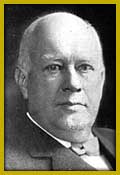
Speer, mayor of Denver from 1904 to 1912, and again from 1916 to 1918, is remembered for his close ties to the Denver utility companies, corporate interests, and merchants of vice — but also praised for his work to build a better Denver, improve the lives of the working class, and lend assistance to the poor. He was said to have close ties to Big Ed Chase, but the probability of close ties to the Blongers is too palpable to ignore. More about Robert W. SpeerLuke Starbuck
BOLONIUM CLUB Another of Matt Braun's western detectives, he also knew "Lou Blomger" as the king of Denver's Tenderloin district, not to mention city hall and the courts. Judge Dan SullivanPLATINUM CLUB Following Con Caddigan's St. Louis arrest in 1884 on bunco charges, an unknown newspaper had this to say about Caddigan's days in Albuquerque: "He appeared as a confidence man first in Albuquerque, New Mexico, where the gang had their trans-continental rendezvous. Albuquerque was then a new town and the bunco men ran it with a high hand, electing as Justice of the Peace Dan Sullivan, one of their friends, and as Marshal and Constable Milton Yarberry, who was hanged last year, and Con Caddigan." Milt Yarberry was marshal before Sam Blonger, and Con Caddigan was constable after. Yarberry was arrested in 1881, and hung in '83, for shooting an unarmed man (the second such occasion), and Caddigan was implicated in a top and bottom swindle not long after Sam was lost his job. And all the while, Dan Sullivan was judge. The articles that describe Sam's exploits in 1882 often mention the Judge as well, of course. He rode with posses, and made arrests. "[Judge] Sullivan and [Lou] Blonger put their heads together Tuesday and in the evening Goodman was taken from the jail and induced by Blonger to go with him and show the hiding place of the jewelry. A small portion of the stolen goods was brought to light from an old adobe house in the northern outskirts of the city. The remainder Goodman has disposed of but just how he refused to state." But more to the point, it seems perhaps that in Albuquerque of the early 1880's, the fix was in. More about Judge SullivanHarry Tammen
PLATINUM CLUB Harry Tammen of the Post was Lou Blonger's old friend and proved instrumental in shielding him from public scrutiny — key to the Blonger Bros. modus operandi, and contrary to the histrionics of fixers like Soapy Smith. When asked by Col. Van Cise why Lou's name did not initially appear in reports on the Blonger gang's arrest, Tammen said: "Yes, that was done by my orders, because Lou Blonger was one of my best friends. I hated like hell to use his name, but the story became so big we couldn't possibly hold it out any longer." And then, of Lou and Tammen's business partner, Fred Bonfils, he said: "You know, son, Lou taught me the most valuable thing I ever knew. He taught me how to catch a sucker." A moment later he added: "I caught one." He jerked his thumb toward Bonfils's office and finished: "I've still got him." More about Harry TammenCarlotta Thompkins ("Lottie Deno")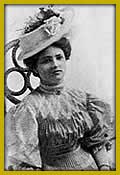
GOLD CLUB The daughter of a wealthy southern gambler and landowner, Carlotta J. Thompkins was sent to Detroit after her father was killed in the Civil War. Her mother had intended she find a husband, but Lottie, accompanied by her nanny, a seven-foot-tall slave named Mary Poindexter, instead took up the life of an itinerant gambler. Riding the riverboats with her lover, gambler Johnny Golden, she traveled from town to town in search of a good game, like so many of those that grace this page. Eventually, she made her way to San Antonio, Texas, where she was house gambler in a place owned by the Thurmonds, and she soon fell in love with Frank Thurmond, who had a reputation both as a gambler and a killer. They are said to have shared a friendly game with Doc Holliday, Wyatt Earp, and others. They married in 1880. Lou Blonger claims in his pension file that he lived with Frank Thurmond from 1883 — just after his Albuquerque days — to 1887, when he submitted a request to revise his military disability pension. Lottie was surely part of this picture as well. By late 1888, Lou and Sam would both settle in Denver. By the mid-Eighties, Frank and Lottie were building a successful life in Deming, New Mexico, with businesses in Kingston, Silver City and elsewhere. Lottie gave up gambling and became active in civic affairs, and Frank a respected businessman. It's worth noting that Lottie is considered the model for Gunsmoke's Miss Kitty. So Lou has both lived with Miss Kitty, and gone to a whorehouse with the Wizard of Oz. Frank Thurmond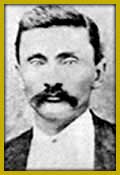
GOLD CLUB A well-known gambler since Civil War days, Frank met Lottie Deno in San Antonio, Texas in the late 1860s, where he had fled after allegedly killing a man in a fight over a game. He married Lottie in 1880 in New Mexico. Lou says in his pension file that he lived with Frank from 1883 — just after his Albuquerque days — to 1887, when he submitted a request to revise his military disability pension. Soon after, he and Sam would both settle in Denver. By the mid-Eighties, Frank and Lottie were building a successful life in Deming, New Mexico, with businesses in Kingston, Silver City and elsewhere. Lottie gave up gambling and became active in civic affairs, and Frank a respected businessman. And Lou was their houseguest for four years. Perhaps he had saloons or gambling houses in the area. He may have prospected. It's just as likely, though, that he was criss-crossing the region, perhaps with his brother, racing horses and gambling. That would have been difficult to describe in a government form... Park Van Tassel ("The Professor")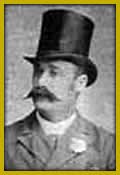
PLATINUM CLUB Behind the bar stands our old pal, the Professor. Barkeep VT, a hustler in his own right, was Lou's drinking buddy, and New Mexico's first aeronaut. On July 4, 1882, the Professor broke the surly bonds before a crowd of thousands at the Albuquerque Independence Day festivities, inaugurating that town's reign as the ballooning capital of America. A few months later, Lou whacked him over the head with the business end of a pistol in response to an ill-considered remark directed at Lou's woman — the madam of the house they were visiting. The Professor survived, and went on to perform balloon ascensions throughout the West and abroad. In 1889, a reporter interviewing Van Tassel remarked that he and Sam Blonger, present at the time, were long-time traveling companions. He was widely reported to have been eaten by sharks after a failed flight off the coast of Hawaii, but the victim was in fact his professional "brother". Park lived to a ripe old age. More about the ProfessorThe Vampire SquadPLATINUM CLUB After the arrest of the Blonger gang, a bevy of obedient beauties was dispatched across the country to bribe victims into not testifying. True Detective Mysteries Magazine, Unmasking The Denver Bunco Ring, Part II, April, 1932 Mr. Donovan, while in Hot Springs, was approached by two beautiful women who had struck up an acquaintanceship with him in a very off-hand way, and asked to stay away from the trial. Mr. Donovan inquired as to what was at the bottom of this peculiar request and the women calmly admitted that they were members of the ring's "vampire squad" who were visiting various victims in various parts of the country, trying to effect buy-offs! Mr. Donovan, figuring that it was his turn to pull a double cross, told the woman that he would refuse to testify at the trial if they made it worth his while. One of the women thereupon produced five thousand dollars in cash and offered it to Donovan. Donovan accepted the money and took the next train for Denver! Joseph Weil ("Yellow Kid")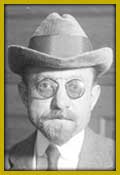
GOLD CLUB Perhaps the best known con man of his era, Weil was one of the great innovators of the trade. He practiced in Chicago, but claimed in his 1948 autobiography to have known a Denver con man named John Blonger who sold him worthless stock certificates for use in his own swindles. An inveterate scoundrel, Weil's antics were a source of amusement to Chicagoans for many years. "The desire to get something for nothing has been very costly to many people who have dealt with me and with other con men," Weil writes. "But I have found that this is the way it works. The average person, in my estimation, is ninety-nine per cent animal and one per cent human. The ninety-nine per cent that is animal causes very little trouble. But the one per cent that is human causes all our woes. When people learn -- as I doubt they will -- that they can't get something for nothing, crime will diminish and we shall live in greater harmony." |
